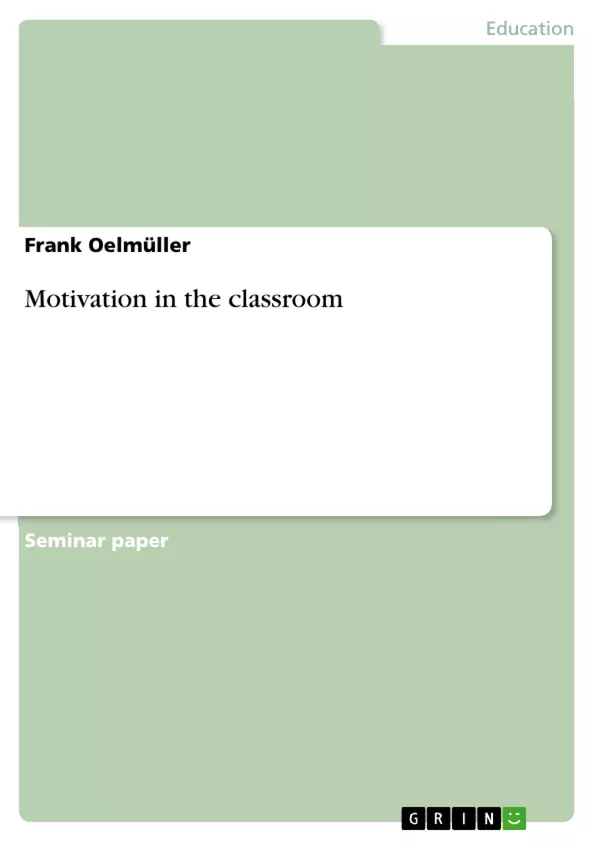“If I want to know more about the world, then I’ll achieve this only by learning.”
This kind of motivation not only was designated as an ‘expansive’ one recently, but also as the one which leads to best results. The main hallmark of the ‘expansive learning’ is the fact that it is born out of complete voluntariness, in other words: the decision to do it or to leave it rests completely on my own.
In contrast to this the ‘defensive learning’ is motivated exclusively by short-term objectives in order to avoid a negative assessment from either the parents, the teachers or any other fellow beings. A ‘normal’ student in this sense will either pretend a learning progression or learn just as much as necessary. This, however, is supported by the evaluation system of today’s schools. Moreover, a student who provides any expansive learning interest may even disturb the planned curriculum and therefore be blamed. Most teachers won’t be fond of any newly discovered ‘expansive’ learning opportunities by a student in particular if they are heading behind the syllabus.
The main questions this essay will be concerned with are whether the teacher is able to foster ‘intrinsic’ and ‘expansive’ learning at all, and, following that, what are the teacher’s means to foster this kind of learning. Since ‘intrinsic’ and ‘expansive’ learning is closely linked to the concept of ‘interest’ the areas discussed in this essay will deal with three conditions for the development of interest at school. These are firstly an interest in the subject, secondly an informing feedback, and thirdly proper instructions, all of them in regard to the teacher. Derived from these conditions the essay will examine the motivational effects of enthusiasm and zest, as well as clarity and commitment on part of the teacher, and the effect of success and failure on part of the student. It will briefly deal with the involved motivational theories and conclude with an assessment in how far it will be possible to reduce the ‘extrinsic/defensive learning’ and the common doubts about the sense of learning at today’s schools.
Inhaltsverzeichnis (Table of Contents)
- I. Introduction
- Intrinsic and Expansive or Extrinsic and Defensive?
- II. Main Part
- 1. The involved Motivational Theories
- 2. Enthusiasm and Zest
- 3. Success and Failure
- 4. Clarity and Commitment
- III. Conclusion
- On the way to 'Utopia': Is it possible to eliminate 'extrinsic/defensive' learning at school?
Zielsetzung und Themenschwerpunkte (Objectives and Key Themes)
This essay aims to explore the possibility of fostering intrinsic and expansive learning in the classroom, specifically addressing whether teachers can promote this type of motivation and, if so, what strategies they can employ. It examines the impact of teacher enthusiasm, clarity, and commitment, as well as the influence of success and failure on student motivation.
- Intrinsic and Extrinsic Motivation
- Teacher's Role in Fostering Motivation
- The Impact of Success and Failure
- Interest Development in the Classroom
- The Concept of 'Expansive Learning'
Zusammenfassung der Kapitel (Chapter Summaries)
- I. Introduction This chapter introduces the concept of 'expansive learning' as opposed to 'defensive learning,' highlighting the importance of self-determination and intrinsic motivation. It emphasizes that while 'intrinsic motivation' is superior, both concepts influence each other and need to be considered together. The chapter outlines the objective of the essay: to explore the teacher's role in fostering intrinsic and expansive learning.
- II. Main Part This section delves into the key motivational theories, particularly the 'Self-determination theory,' and examines how it can be applied to classroom settings. It focuses on three critical conditions for developing interest in the classroom: subject-matter interest, informative feedback, and effective instructions. The chapter analyzes the effects of teacher enthusiasm, clarity, and commitment, as well as the impact of success and failure on student motivation.
Schlüsselwörter (Keywords)
The main keywords and focus topics of this essay include intrinsic motivation, expansive learning, defensive learning, teacher's role in motivation, self-determination theory, interest development, success and failure, and the concept of 'fitting' in education.
Frequently Asked Questions
What is the difference between expansive and defensive learning?
Expansive learning is born out of voluntariness and intrinsic interest, leading to better results. Defensive learning is motivated by short-term objectives, such as avoiding negative grades or criticism from parents and teachers.
Can teachers foster intrinsic motivation in the classroom?
Yes, teachers can foster intrinsic motivation by showing enthusiasm, providing clear instructions, and offering informative feedback that supports the student's development of interest.
What is the Self-Determination Theory (SDT) in education?
SDT suggests that students have basic needs for autonomy, competence, and social relatedness. When these needs are met, students are more likely to develop intrinsic motivation and engage in expansive learning.
How does teacher enthusiasm affect student motivation?
Teacher enthusiasm and zest act as a catalyst for student interest. A committed teacher who clearly communicates the value of the subject can significantly increase the students' willingness to learn.
Why do some students only learn just as much as necessary?
This is often a result of defensive learning, which is supported by current school evaluation systems that focus on grades rather than the learning process or individual interest.
- Quote paper
- M.A. Frank Oelmüller (Author), 2006, Motivation in the classroom , Munich, GRIN Verlag, https://www.grin.com/document/64942



